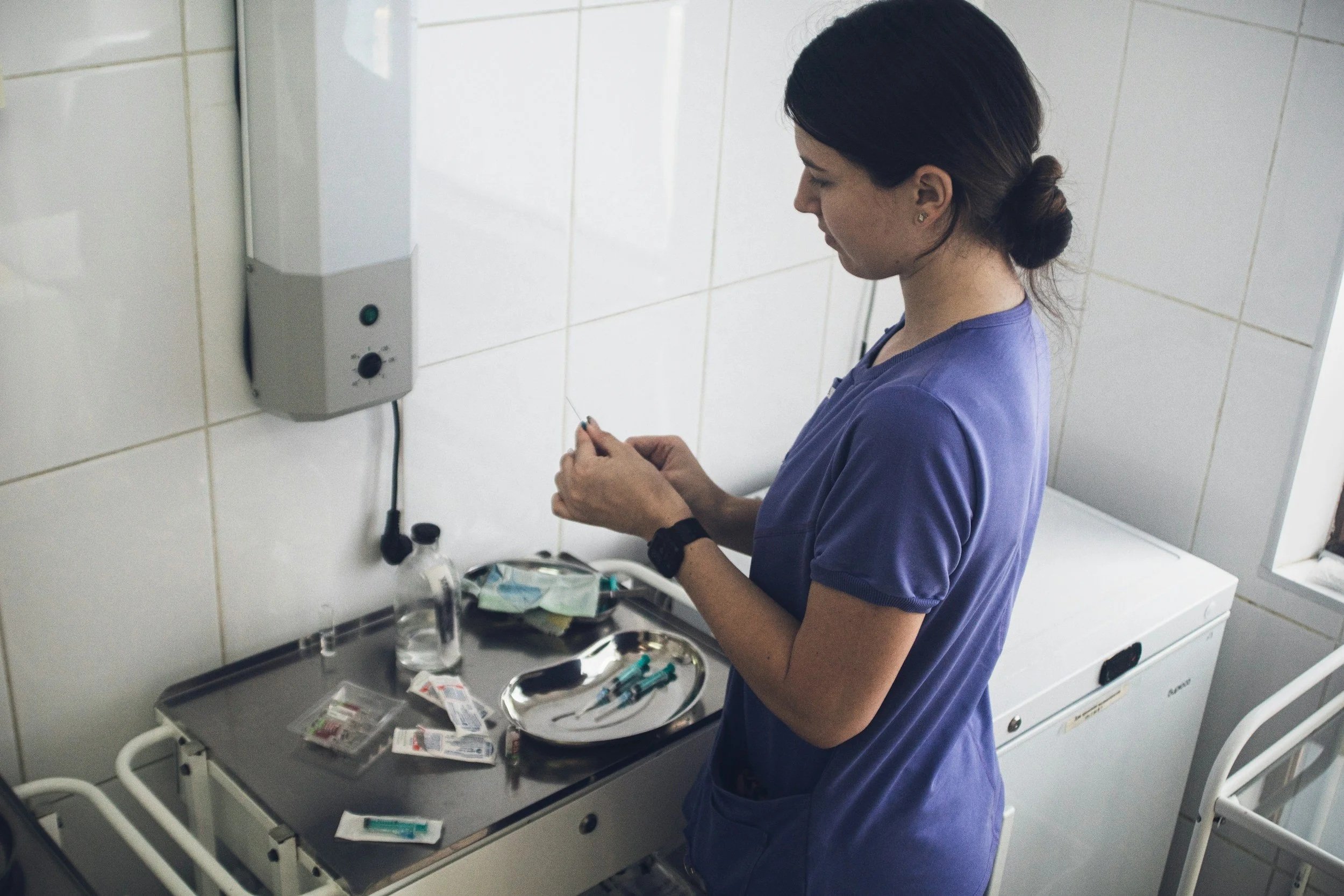Many women who are considering egg freezing inquire about if they will need to stop their current daily medication or supplements. At your initial consultation, your reproductive endocrinologist will go over your list of over-the-counter and prescription medications and any supplements you may be taking.
In most cases, commonly used medications like antidepressants (like Zoloft®, Prozac®, Wellbutrin®), thyroid medications, vitamins, and sleep aids such as melatonin or Unisom® (Doxylamine) can be safely continued during the egg freezing process. Allergy medications like Benadryl, Claritin, or Zyrtec are also generally safe to take during egg freezing.
Allergy shots, introducing allergens into your body to build up immunity over time, is more complicated. Depending on the allergens involved and the severity of your allergic reactions, your allergy shot schedule may need to be adjusted. Your fertility specialist can work with you and your allergist to coordinate your treatment plan to minimize any potential conflicts.

One group of medication to stop during your stimulation would be any non-steroidal anti-inflammatory medications such as ibuprofen (Advil®, Motrin®) or aspirin as these might increase your risk of bleeding during the egg retrieval surgery. Acetaminophen (Tylenol®) may be a safer option for pain relief, but it's essential to consult your provider first.
GLP-1 receptor agonists or semaglutide (Ozempic®, Wegovy®, Mounjaro®) is another class of medications that should be discussed with your provider. Though there is limited data on their effect on eggs or egg freezing itself, it has been associated with delayed gastric emptying that can potentially cause complications with anesthesia during the egg retrieval surgery. Some clinics may even require you stop it for a period of time prior to starting your egg freeze process.
Lastly, while some herbs are considered safe for general use, their effects on fertility are not always well understood, and they may interact with medications or hormones used during IVF stimulation. Some common herbs to avoid during egg freezing include: St. John’s Wort, ginseng, black cohosh, licorice root, chasteberry (Vitex), and dong quai.
Remember, your fertility specialist is here to help guide you. You do not need to change any of your medications before you make your first consultation appointment. They can provide personalized recommendations based on your medical history and specific circumstances to ensure that you're using safe and appropriate medications during IVF stimulation.

Dr. Irene Woo is a fertility specialist at HRC Fertility. She is an esteemed and compassionate medical professional holding dual board certifications in Obstetrics and Gynecology, as well as Reproductive Endocrinology and Infertility. Dr. Woo’s patient-centric approach underscores the significance of conducting a comprehensive diagnosis to tailor treatment options.
Learn more about about HRC Fertility on Freeze.
Answered by Dr. Roy Handelsman from HRC Fertility. Understand how ovarian cysts and ovarian surgery may impact the egg freezing process.
Answered by Dr. Rashmi Kudesia from CCRM Fertility Houston. Here’s a checklist for before, during, and after your egg freezing consultation, including 11 questions you should ask the doctor.
Answered by Valerie Shafran, MSN, FNP-C from Extend Fertility. Discover why fertility experts urge women to stop taking GLP-1 agonists before an egg freezing cycle.
Answered by Dr. Nidhee Sachdev from South Coast Fertility Specialists. Explore what AMH tells us about a woman’s ovarian reserve or how many eggs she has left.
Answered by Dr. Hade from Generation Next Fertility. Understand how egg freezing does not cause long-term weight gain yet there is a chance of transient bloating.
Answered by Rijon Charne, JD from Sunray Fertility. Explore what a reproductive estate plan entails and the situations where having one can make a big difference.
Answered by Rijon Charne, JD from Sunray Fertility. Learn more about the importance of clinic disposition forms, including what they do and don’t cover.
Answered by Rijon Charne, JD from Sunray Fertility. Discover the legal nuances that can shape your options when freezing eggs or embryos.
Answered by Dr. Joshua Klein from Extend Fertility. Learn how birth control relates to egg freezing and if you will need to stop your hormonal birth control before starting the procedure.
Answered by Dr. Jesse Hade from Generation Next Fertility. Discover the important factors that affect chances of egg freezing success in your late thirties.
Answered by Sidonia Buchtova, PA-C, C-RHI from Refresh Psychiatry. Understand if you can stay on an SSRI or SNRI when freezing your eggs.
Answered by Sidonia Buchtova, PA-C, C-RHI from Refresh Psychiatry. Discover tips to help support your mental well-being during preparation, throughout the cycle, and after your egg retrieval, especially if you have a history of anxiety.
Answered by Dr. Katharina Spies from Vida Fertility. Learn about who should consider supplements before and during fertility preservation, and how supplements could support your egg freezing cycle.
Answered by Dr. Serin Seckin from Generation Next Fertility. Understand the key differences to help you make an informed decision that aligns with your personal and reproductive goals.
Answered by Dr. Ido Feferkorn from the Reproductive Medicine Group. Learn how Polycystic Ovarian Syndrome (PCOS) may affect the egg freezing process and outcomes of fertility preservation.
Answered by Dr. Meera Shah from Nova IVF. Understand the potential risks of egg freezing to help you evaluate if it is right for you.
Answered by Dr. Hade from Generation Next Fertility. Learn from start to finish the entire process of what happens on the final day of an egg freezing cycle.
Answered by Dr. Sahar M. Stephens from Northern California Fertility Medical Center. Understand the probability of pregnancy based on the number of eggs frozen and the age at which you freeze.
Answered by Dr. Alison Peck from HRC Fertility. Discover which medications are commonly used for ovarian stimulation during an egg freezing cycle.
Answered by Dr. Kathryn Snow from Piedmont Reproductive Endocrinology Group (PREG). Understand the side effects that you may experience when freezing your eggs.
Answered by Lia Schiller, MSN, AGNP-BC from Extend Fertility. Learn why IUDs can stay in place throughout the egg freezing process.
Answered by Dr. Woo from HRC Fertility. Learn how some medications need to be stopped for an egg freezing cycle while some medications can be continued.
Answered by Dr. Dan Nayot from The Fertility Partners. Learn how artificial intelligence is providing women with more information than ever before about their eggs.
Answered by Dr. Joshua Klein from Extend Fertility. Egg freezing doesn’t impact your chance of getting pregnant naturally, because egg freezing makes use of eggs that would otherwise have been lost.
Answered by Dr. Dan Nayot from The Fertility Partners. Understand the distinction between egg quantity and quality, and explore how AI is transforming egg quality analysis.
Answered by Dr. David E. Tourgeman from HRC Fertility. Understand what options exist for what to do with your frozen eggs if you decide not to use them for IVF.
Answered by Dr. Armando Hernandez-Rey from Conceptions Florida. Learn about minimal stimulation egg freezing cycles and how they can decrease the risk of ovarian hyperstimulation syndrome.
Answered by Dr. Ido Feferkorn from the Reproductive Medicine Group. Find out how egg freezing medications work and how protocols can be adjusted if you can’t take estrogen.
Answered by Dr. Ido Feferkorn from Reproductive Medicine Group. Learn how egg freezing fits into the menstrual cycle and how timing can be customized.
Answered by Dr. Elena Santiago from Vida Fertility. Understand the ins and outs of egg freezing in Spain as a non-resident, including timing, costs, and more.






























